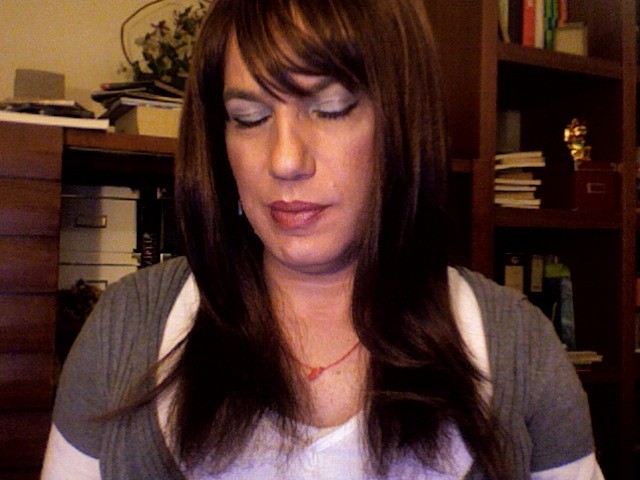A recent article on Crossdreamers by Joanna Santos discussed the issue about arousal when dealing with gender dysphoria, explaining how sexual orientation was so erroneously interpreted by Blanchard’s very misguided theory, and how the newer generations of transgendered people view their identity, their gender presentation, their sexual preferences and their gender role in today’s society, which is so different — but much more naturally assumed — than what the ‘old school’ used to think about.
I had a lot to comment on this subject, but unfortunately, as it so often happens to me, the commenting space was too brief for expounding all my thoughts! So, instead, I wrote a whole article here, and just posted a link there 🙂
Gender identity is not about arousal
I’m particularly fond of discussing the issue that ‘gender identity is not about arousal’, which Joanna states in her article. Recently, in my country, a discussion has started about allowing anyone to legally define their gender identity independently of any medical opinion on the subject. We were a bit revolutionary in 2011 by establishing a very liberal law that turned the legal gender change as a simple bureaucratic procedure, but one of the requirements was still ‘having a diagnosis of gender identity disorder’ — because associated with the legal change of gender, there was (free) medical care associated with the transition procedures and the change. As such, a medical opinion was a requirement. In 2012, the DSM-5 changed the nomenclature (‘gender identity disorder’ became ‘gender dysphoria’), a new debate started, and what was a revolutionary law in 2011 is now outdated in 2015. A few liberal groups are now trying to update the law to reflect the current understandings on gender identity and presentation, but it will be a few years until that draws to a conclusion.
Part of the debate comes exactly from the ‘arousal’ issue. I’ve learned that a low libido in regular crossdressers may be a symptom of gender dysphoria, but certainly that is not universal. By contrast, hypersexuality might exclude people from transition (at least in my country), since it is usually a sign of transvestite fetishism, and not gender dysphoria. Putting it in other words: since a legal gender change still requires a medical report in my country, this means that how much you’re aroused plays a role in the diagnosis!
I can only give myself as an example. I’m not in transition and probably will never be; however, I’m suffering a major atypical depression (not the more usual melancholic depression) closely related to what I perceive to be gender dysphoria. My libido has always been low and I can trace it back to my teens, when I was unable to get any girlfriend and, as a consequence, assumed that I was too ugly and repulsive, and that sex would never be something I’d had (I actually lost my virginity only at 27!). As a result, I pretty much lost all interest in sex. I don’t consider myself asexual, though.
When crossdressing, evidently I got sexually aroused, and it was usual that I’d masturbate to my female self-image — it was easier to do that when dressed, but even when just imagining myself as a woman, it was usually pretty easy to get aroused and successfully masturbate. Nevertheless, I never dressed because it aroused me sexually; the excitement, the adrenaline, the serotonin comes mostly from a feeling that being a woman is something I enjoy far more than having to drag this male body and personality along.
Now that I’m on antidepressant medication, as well as on anxiolytics, the sexual drive dropped almost instantly to zero. After just 2 or 3 days on medication, I was simply unable to masturbate any more. What used to be something that I did 2-3 times per week was reduced to one single time in about 6 weeks, and that required a lot of effort — too much, indeed, for me to bother. The truth is that my interest in anything sexual dropped so low as to become inexistent; but, more important than that, I really don’t bother much with it any more, and, in a sense, it’s almost a relief.
Now I’m not taking hormones, and probably never will (I’ll let the doctors discuss that with me in the future, during my therapy; it’s too early to seriously consider it). My testosterone levels are very likely normal for my age, but the truth is that they fail to provoke any arousal to the level that would be normal for a male at my age. Similarly, the aggression/irritation levels produced by testosterone are dramatically reduced by the anxiolytics to very low levels. So, although I’m not taking female hormones, nor reducing the amount of male hormones, I’m experiencing a little taste of what it feels to have your brain less flooded with male hormones triggering compulsive sexual desires and aggressivity.
If my gender questioning (I’ll avoid the word dysphoria for a bit, since that actually requires a diagnosis which I don’t officially have yet) was limited to sexual arousal — what I would call transvestite fetishism, to be consistent with the DSM-5 — then the further reduction in my libido should make crossdressing uninteresting. Indeed, it would be a strong case to show a cause/effect relationship between depression and crossdressing: depression is most often caused by an abnormally low flow of serotonin towards the brain, so, to counter that, I would crossdress to increase serotonin levels. As the depression gets ‘cured’ by drugs artificially increasing the amount of serotonin in the brain, then other serotonin-raising activities would be unnecessary. In fact, many people who believe they have some sort of gender dysphoria, but start getting treated for depression, suddenly realise that their crossdressing urges simply disappear.
My case is evidently the total opposite. Not only the crossdressing urges have not gone away, but they have increased at all levels. This is also tied to the total reversal of my wife’s restrictions on my crossdressing: she now allows me to go out with my friends, and I’ve even picked her up at the university and elsewhere fully crossdressed, even in broad daylight. So, while I’m certainly not yet a woman in full time, nor even part time, I have certainly gone far beyond my usual ‘closet’ crossdressing at home. And there have been a lot of completely new experiences for me, like interacting with absolutely normal people (outside the ‘crossdressing ghetto’ of similarly-minded fellow crossdressers), some of which have most definitely treated me as a woman, even if I don’t really ‘pass’ that well.
So although my libido has been drastically reduced, to the point that I could almost claim to be asexual (but not quite), the desire to manifest my inner self-image as a female, and present myself physically in public as a woman, has increased by several orders of magnitude. It is more exciting than ever, but also much more relaxing to be able to shed the male role I so much hate for a few hours, and just let myself be like I want to be. This, of course, also increases the serotonin levels, and I believe it contributes positively to help to fight depression — even though, in such a short period, I don’t really see many effects.
However, something most definitely didn’t change. I still get very much excited (but not necessarily in the sexual sense) by presenting myself as a woman. I’m not ashamed to admit that I feel sexy, while as a male, I feel like a monster that scares people off. I love to flirt, and I do that far more when presenting as a woman than in my male role — even though I have no intention and no desire to go further (after all, I’m very happily married, and since sexual activity lost all the appeal for me, I see it as a pointless pursuit). All those feelings have not changed. In fact, if anything, they have but increased. I’ve already talked to my therapist telling her that thinking about presenting myself as a woman has become literally obsessive. This started even before depression, of course, and it increased dramatically once my wife reverted her decision on the restraints and limitations she imposed. I cannot say if it’s ‘better’, or if it is actually good for me, in terms of fighting depression. But it’s something I cannot avoid. Being a woman is something that I crave even more every day, and it’s with difficulty that I self-restrain myself from crossdressing more and more. It has become my only goal in life, the only thing that I pursue obsessively, and everything else pretty much lost all appeal. This, of course, is completely consistent with the diagnosis of atypical depression. But it’s not necessarily a sign of gender dysphoria.
While the chemical mechanisms are completely different from hormone therapy, I nevertheless see some similarities with some reports of people under transition. Anxiety/irritation/aggressivity are triggered by male hormones (and yes, of course women have those as well, and get anxious/irritated/aggressive just as males), and, by blocking male hormone production, transexuals under HRT report almost uniformly a sense of well-being, of calmness, of reduction of their anxiety levels. Similarly, their libido levels decrease (since less testosterone is active in their bodies), which actually might be experienced as ‘strange’ at the beginning, but there rarely is any ‘regret’. In fact, from what I’ve read, most report that it is like a huge burden has been dropped — there is one less thing to worry about, and that, in turn, lowers the anxiety levels. In many cases I’ve met, transexuals in transition might even not take female hormones for a while, but limit themselves to reduce the testosterone levels in their organism, and this already provides them with much needed relief. Of course, to get the benefits of female hormones — namely in re-shaping the body — taking feminine hormones is the next step. But it’s pointless to do so without blocking testosterone first, since the (male) organism converts female hormones into male hormones. Those male hormones need to be blocked first.
On later stages, of course, as the body smoothly changes appearance by reacting to female hormones, and as transition draws to a close, the libido might rise again, just as before — since obviously female hormones trigger the libido as well!
So the whole point here is that basing a diagnosis on how much sexual arousal plays a role in transgenderity, especially from a clinical point of view, is not necessarily correct — and such theories that were based on sexual preferences, like the ones so misguidedly proposed by Blanchard, must definitely be wrong, or at least very incomplete. It’s true that one way to distinguish gender dysphoria from, say, transvestite fetishism, is to analyse the degree of sexual arousal. For all purposes, almost all fetichist crossdressers are hypersexual (in the clinical term), irrespectively of their age and their ability to perform sexually (they will still feel the urge and the craving for sexual activity, even if their body is not up to it). Gender dysphoria, by contrast, is not necessarily linked to sexual arousal. It might trigger sexual arousal, and sometimes crossdressing is the only way to trigger any kind of sexual arousal, but it is not necessarily the only reason for gender dysphoria.
This has three implications, of course. The first is that doctors evaluating gender dysphoria have to be careful not to get ‘lost’ in obscure Freudian explanations regarding the role of sex in a transgendered individual. The newer generations of crossdreamers are showing exactly that; they have a much more fluid ability to present the gender they identify with (or the binary gender they reject), and not everything is tied to sex, rather the contrary.
The second implication is for the community. In many crossdressing communities, for instance, it’s hard to judge from external presentation what exactly drives a particular individual to crossdress. As Joanna Santos so well pointed out, most drag queens identify themselves with the male gender and have no intention to ‘switch’ their identification with the female one. However, drag queens may very well be homosexual or bisexual, without losing, however, their strong identification with the male gender, no matter how they present themselves. The vast majority of the non-fetishist crossdressers have their identity strongly rooted in the male gender, no matter how they present themselves publicly; most are heterosexual, often bi-curious, and sometimes openly bisexual; many, however, don’t feel any sexual urges or desires while crossdressed. They have found a balance between both genders. As such, they expect members of their community to have similar sexual orientations. And all fetishist crossdressers, almost without exception, are even more strongly rooted in their male gender, but, for them, crossdressing is all about sex. They are also almost always bisexual, even if they don’t label themselves as such: while crossdressed, they almost exclusively desire male partners, but once they drop their female attire, they wish female partners. This is so natural for them that they have a huge difficulty understanding how non-fetishist crossdresser can think differently.
And the third implication is legal. We have abandoned several restrictions for transition that implied a certain ‘stereotyped transexual’. A MtF transexual was supposed to be only allowed to transition if they wished to fully become a woman, through surgery and hormone therapy, and was strongly attracted to male sexual partners; the reverse, of course, would apply to FtM transexuals. In that case, FtM transexuals were also often required to be sterilized. In both cases, transexuals were forced to divorce before finishing their transition.
These days, in most modern countries, especially those which also have same-sex marriage, almost all those restrictions were lifted, because they were so limiting that many transexuals desiring transition had to routinely lie about themselves in order to get the proper authorizations for transition. It’s a sad chapter in the history of transexuality to know that there were even several websites offering tutorials for transexuals on ‘how to lie to your doctor to get your transition’. Several academic papers (and even books) were written on the subject, and it was clear that the legal requirements were absurd — people would just avoid the restrictions by thoroughly lying about themselves.
I’m obviously not an expert in international law, so I can only give my own country’s laws as an example. Transition is based on the psychological and psychiatric evaluation of the subject, and a diagnosis of gender dysphoria is a requirement. The name change has to reflect an officially recognized name of the opposite gender than the one assigned at birth. Beyond that, nothing else is a requirement: surgery or hormones are optional; genitals and secondary sexual characteristics are definitely not part of gender identity and the law recognizes that very clearly; and neither sexual orientation, nor sexual preferences, nor marriage are obstacles for transition (but if someone is married, the partner has to give their consent to the transition). Especially not marriage, since same-sex marriages are perfectly legal in my country.
There is, of course, still something missing. The next debate will be around the need for a clinical evaluation of gender dysphoria. Ultimately, the goal is to allow people to fully identify with whatever gender they desire (or even none at all), without the requirement to get a medical evaluation of their condition. The medical evaluation might be still necessary if the transition requires surgery and hormone replacement therapy, since both are financed by the state and free for the transexual, and, as such, it’s desirable to have a medical opinion — since taxpayer’s money is used to provide those surgeries and hormones.
So we have gone truly a long way, separating the several aspects of ‘gender’. At least at a high-level debate, it seems possible to do that separation. Legislation is often enacted at this level. However, society as such is still light-years away from reality: we transgendered people are still seen as sexual perverts by most transphobes. The irony, in my case, is to be labeled as a sexual pervert when I have zero libido, and, therefore, zero interest in sex…





